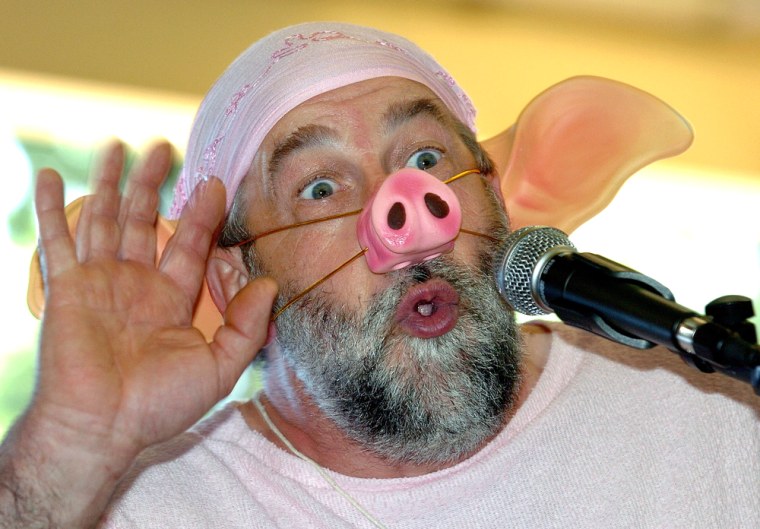Yohann and Olivier Roussel's performance climaxed in a cacophony of oinks and grunts, unleashing an explosion of applause.
But it was only after lengthy jury deliberations that their hopes were confirmed — the father-and-son team were France's official Pig-Squealing Champions for 2005.
The judges, headed by a former champion, had been impressed by their vocal imitations of pigs in all four of the required categories, reflecting key milestones of porcine existence: from noisy farmyard birth to death under the knife, via suckling and — inevitably — mating.
France's handful of "fetes folles," or crazy festivals, attract a regular cult following and throngs of incredulous holidaymakers. One fete features an acclaimed lying contest; another boasts a distance spitting competition.
But the annual Pig Festival and French Pig-Squealing Championships in Trie-sur-Baise, a remote farming village in the foothills of the Pyrenees, are acknowledged to be in a class of their own.
Besides the pig-squealing, there were awards in the Sunday competition for pigging out — this year's winner ate nearly 4 feet of blood sausage in under five minutes — and heavy gambling on the final eight-piglet race.
Stepping up to the microphone in hastily improvised pig outfits — the decision to enter the competition had been taken only the night before — the Roussels let rip with a chorus of uncannily realistic squeals, grunts and snuffles before the 500-strong audience, topped with a delicately choreographed courtship scene.
First prize: a butchered pig
Newcomers to the contest from nearby Pouy-Loubrin, they beat off six other finalists including regular contender Jean-Paul Louge. But the pair modestly downplayed their win as they waited to collect first prize: a whole pig, butchered and cured with traditional local methods.
"We still have work to do to perfect the pig act," said Olivier, 40, his 20-year-old son Yohann nodding agreement. "But after that, who knows? Why not try some other animals?"
Louge, who placed sixth, was equally gracious in defeat, stressing that the contest was just a bit of fun. "I don't train for this," he said. "It comes naturally."
Contestants and spectators travel to the Pig Festival from across the country and beyond; in past years, its antics have also been witnessed by television viewers in countries from Germany to Korea.
"You are Entering Pig Country," road signs advise motorists on the main approaches to the village, home to 1,100 people.
For most of the year, however, that's just a sad anachronism. Once the region's economic backbone, pig farming has industrialized, globalized and moved elsewhere. The old pig market, one of France's largest with up to 7,500 animals sold daily until the decline took root in the late 1970s, now stands silent.
Hog overload
But one Sunday every August, this corner of France's deep south becomes the heart of Pig Country once again. Bunting and pig-themed posters adorn trees and roadsides. Local waitresses all sport pig tails — and not the kind you wear on your head.
"The Pig Festival came about to stop us forgetting about our past," said Jean-Claude Theze, an ex-farmer who now runs one of the cafes in Trie-sur-Baise.
The village offers as good a symbol as any of modern France's agricultural underbelly and the fierce struggle waged by its rural communities to hold onto identities and livelihoods.
Faced with a collapse in pork prices, some farmers have moved into beef and higher-value black pigs, which can't be produced so intensively. Tourism has also become an important earner.
The villagers are not letting the championship's global exposure go to their heads, Theze said.
"We know it's being held up to ridicule," he said. "We take it all as a joke. It's about spreading a bit of happiness, that's all — we just hope people might come back another day."
